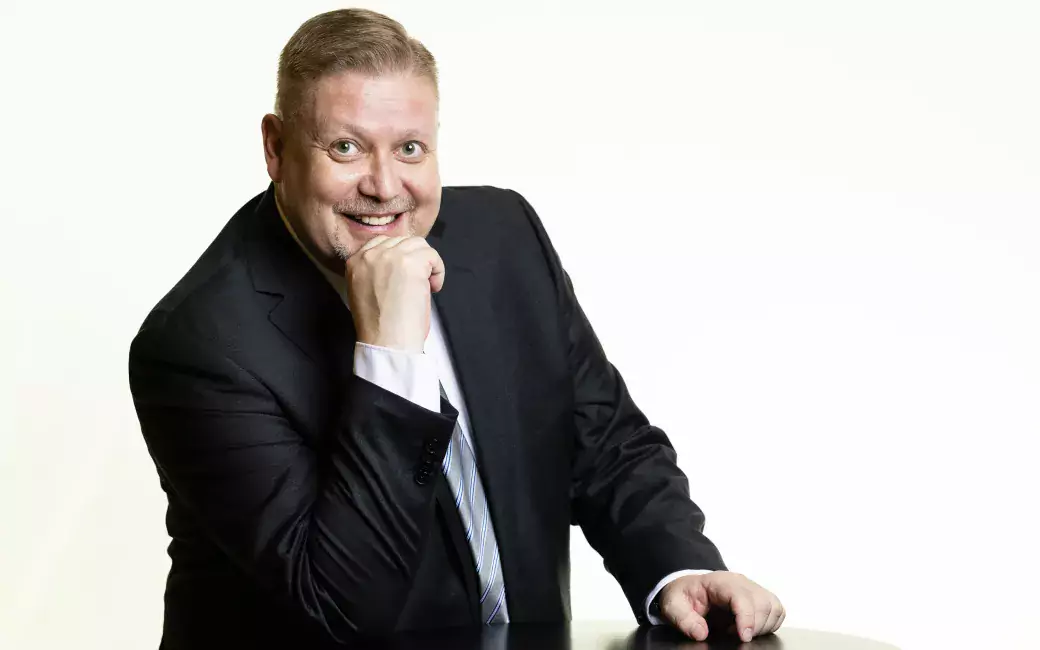Under Olli-Pekka Lappalainen's tutelage, future dentists gain not only technical skills, but also the ability to meet their patients. Lappalainen, who was recently admitted to the Teachers' Academy, wishes to ensure that students are coping and that they will fare well in professional life.

Olli-Pekka Lappalainen always keeps his office door open. Lappalainen, 50, is a dental specialist who works as a university lecturer at the University of Helsinki and as a clinical instructor in oral and maxillofacial surgery at HUS Helsinki University Hospital. He has noticed that, quite often, the students arriving at his office have problems with coping.
While adopting and applying a great deal of knowledge is part and parcel of studies in dentistry, students' ways of studying have become increasingly fragmented. The effects of spending time on social media on the ability to concentrate can also have an impact.
"Young people want information piecemeal, synthetising the pieces independently," Lappalainen says.
As a teacher, he has taken the view that students' wishes should be taken into consideration, since it promotes their coping.
In practice, this means that Lappalainen punctuates teaching with pauses, also utilising educational technology and other digital methods. He emphasises that it is the teacher's duty to ensure that, in spite of breaking down the content of teaching, a thread running through it remains. Teachers also have a backup: if necessary, students can be instructed to review their previous learning.
"I've also wanted to hold on to essay-form assignments. Essays are laborious for teachers, but still a good way to test students' overall understanding."
Are university careers attractive?
Lappalainen began his teaching career with substitute stints while still a student himself, teaching anatomy, physiology and pathology to nursing students. He got into university teaching while writing his doctoral thesis, and for the past 15 years it has been his primary job.
"I've found my place. Teaching is a refreshing oasis for me."
Alongside teaching, Lappalainen works as a dental specialist and conducts research, ensuring that research is linked to teaching. And he is working on his second doctoral thesis, this time in education. Lappalainen also takes an educational view to his students.
"I recognise potential future teachers among my students. In addition to a natural inclination, you also need passion for the teaching profession," Lappalainen says.
But is that enough? According to Lappalainen, a shortage of teachers is emerging in dentistry. He believes now is the time to consider whether university teaching is a desirable career option.
"The salary for teaching clearly lags behind that paid for clinical work, which hampers recruitment. Bureaucracy and rigid operating models are also direct impairments. These are the things that the University must address," Lappalainen says.
"We need well-trained and experienced teachers to maintain a high level of healthcare in the future. Fortunately, the University of Helsinki wishes to develop teaching. The importance of this must be understood in the future too, and in this, the Teachers' Academy is a good network and source of support. Teachers have a lot of problem-solving skills and potential for solutions."
The text continues after the video.
Technology meets humanity
Today, students of dentistry may hold a drill in their hands while wearing VR glasses on their heads. According to Lappalainen, augmented reality is extremely well suited to teaching fine motor skills.
Still, technical solutions are not fit for everything. Providing care to actual patients remains an integral part of dental education, and students already have the opportunity to work alongside experienced professionals at the initial stages of their professional path.
"This is a human science. Students must be able to communicate and meet people. For instance, in the case of fearful patients, dentists need to understand factors underlying their fear. They furthermore should invest their personality in such encounters," Lappalainen says.
Language can trip up even talented people
Students visiting Lappalainen's office may also be worried about whether they will be able to complete their studies in Finnish.
"If Finnish or Swedish is not a student's first language, it may be difficult for us to ascertain that they are learning as intended. Sometimes examination answers show that they have not understood something."
Lappalainen has considered appropriate solutions. According to the Universities Act, teaching must be provided in Finnish and Swedish, and those two are the languages of medical degrees in Finland. Offering an English-language option for individual students would put a strain on teachers.
And that would not necessarily be the best option, as the goal is to train students in treating patients who, for the most part, speak Finnish or Swedish. Language proficiency cannot be assessed even in entrance examinations, as that would eliminate, already at the application stage, many promising applicants who speak another language at home.
"However, all of our students learn the basic terminology in English, as our teaching materials are now primarily in English. Consequently, healthcare services can be provided in English too. More specialists in healthcare are needed, and everyone wishing to pursue the academic path should be offered the opportunity," Lappalainen says.
In other words, teachers must consider increasingly carefully how to keep students with diverse backgrounds on board. Evolving educational technology and the support of colleagues help, but the student community is also important.
"University studies lasting five to six years do after all promote language acquisition. And when students study together, the group also keeps them afloat. I am confident that the Faculty of Medicine will continue to produce professionals who will be successful in professional life."






